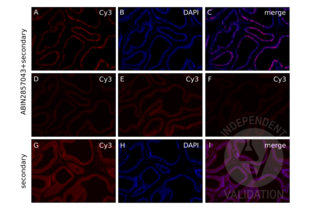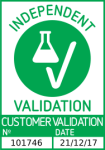Androgen Receptor Antikörper (N-Term)
-
- Target Alle Androgen Receptor (AR) Antikörper anzeigen
- Androgen Receptor (AR)
-
Bindungsspezifität
- N-Term
-
Reaktivität
- Human
-
Wirt
- Kaninchen
-
Klonalität
- Polyklonal
-
Konjugat
- Dieser Androgen Receptor Antikörper ist unkonjugiert
-
Applikation
- Western Blotting (WB), Immunofluorescence (IF), Immunohistochemistry (Paraffin-embedded Sections) (IHC (p)), Immunocytochemistry (ICC)
- Kreuzreaktivität
- Human, Maus
- Produktmerkmale
-
Rabbit Polyclonal antibody to Androgen Receptor (androgen receptor)
Androgen Receptor antibody [N1], N-term - Aufreinigung
- Purified by antigen-affinity chromatography.
- Immunogen
- Carrier-protein conjugated synthetic peptide encompassing a sequence within the N-terminus region of human Androgen Receptor. The exact sequence is proprietary.
- Isotyp
- IgG
- Top Product
- Discover our top product AR Primärantikörper
-
-
- Applikationshinweise
- WB: 1:500-1:3000. ICC/IF: 1:100-1:1000. IHC-P: 1:100-1:1000. Optimal dilutions/concentrations should be determined by the researcher. Not tested in other applications.
- Beschränkungen
- Nur für Forschungszwecke einsetzbar
-
- by
- School of Science and Engineering, Tulane University
- No.
- #101746
- Datum
- 21.12.2017
- Antigen
- Androgen Receptor
- Chargennummer
- 39476
- Validierte Anwendung
- Immunofluorescence
- Positivkontrolle
- prostate from inducible ARlacZ mouse
- Negativkontrolle
- secondary antibody only
- Bewertung
Passed. ABIN2857043 shows robust and specific staining of the AR in mouse prostate at a dilution of 1:100. When the antibody is more dilute, the staining is very weak (1:250 or 1:500). Further dilution (1:1000) eliminates the signal completely.
- Primärantikörper
- ABIN2857043
- Sekundärantikörper
- goat anti-rabbit Cy3 conjugated antibody (Jackson ImmunoResearch)
- Full Protocol
- Prostate Tissue from ARlacz transgenic mouse or wild type mouse is fixed via transcardial perfusion with 10% formalin and postfixed at 4°C overnight. Tissue from the transgenic mouse is used for a positive control while tissue from the wild-type mouse is used with the AR antibody.
- Dewaxing and rehydration:
- CitriSolv (Decon Laboratories, 1601H, 11068) 2x for 5min.
- 100% ethanol 2x for 3min.
- 95% ethanol 2x for 3min.
- 70% ethanol 2x for 3min.
- Rinse well in distilled H2O.
- HIER:
- Dilute 10x citrate buffer pH6.0 1:10 with dH2O and place in cases.
- Place one slide into each case in the preheated pressure cooker (Hamilton Beach).
- Antigen unmasking for 40min at 92-99°C.
- Remove slides from pressure cooker (but leave them in the cases with citrate buffer). Let slides cool down for 20min to approximately 30°C.
- Wash sections 2x for 5min with PBST rocking in a coplin jar.
- Wash sections for 5min with PBS rocking in a coplin jar.
- Permeabilize sections 10min in PBS + 0.2 Triton X-100 rocking in a coplin jar.
- Wash sections 3x for 5min with PBST rocking in a coplin jar.
- Aspirate liquid, circle tissue with a PAP pen and let dry.
- Block each section with 200µl blocking solution (PBS containing 1% BSA, 5% normal goat serum, and 0.02% Triton X-100) for 1h at RT.
- Aspirate blocking solution.
- Incubate sections with 100µl primary
- rabbit anti-androgen receptor antibody (antibodies-online, ABIN2857043, 39476) diluted 1:100, 1:250, 1:500, and 1:1000 in 1:10 blocking solution ON at 4°C.
- rabbit anti-β-galactosidase antibody (Life Technologies, A1132, lot 1720092) diluted 1:500 in 1:10 blocking solution (in PBS) ON at 4°C.
- Include a no primary antibody negative controls.
- Aspirate the liquid.
- Wash sections 2x for 5min with PBST.
- Wash sections for 5min with PBST.
- Incubate sections in the dark with secondary goat anti-rabbit Cy3 conjugated antibody (Jackson ImmunoResearch) diluted 1:400 in PBS for 1h at RT.
- Aspirate the liquid in the dark.
- Wash sections in the dark 2x for 5min with PBST.
- Wash sections in the dark for 5min with PBST.
- Nuclear counterstaining with 14.3mM DAPI diluted 1:50000 in PBS for 5min at RT in the dark.
- Wash sections in the dark 2x for 5min with PBST.
- Mount sections in mounting medium (Invitrogen, P36930, lot 1811419) put 1 drop of medium on each section and cover with a coverslip in the dark; seal your slides with nail polish to avoid dehydration. Store sections in the dark at 4°C.
- Visualization on a microscope (Nikon, Eclipse Ti) with 20x objective; exposure time TRITC AR 100ms, DAPI 100ms.
- Anmerkungen
ABIN2857043 shows robust staining for the AR at a 1:100 dilution (A). Dilution series was determined by manufacturer's recommendations. ABIN2857043 shows weak AR staining at 1:250 (D) and 1:500 (E) with higher background while it does not work at 1:1000 (F).
The staining for the AR is clearly nuclear. This is shown by colocalization with the nuclear stain DAPI (B and C). Additionally, the staining pattern seen with the AR antibody is similar to the staining pattern of β-galactosidase seen in the ARlacz transgenic mouse. The ARlacz transgenic mouse expresses β-galactosidase (β-gal) under the control of the AR promoter. Therefore, β-gal is expressed wherever the endogenous AR is expressed.
Exclusion of the primary antibody eliminates nuclear staining, demonstrating that the AR staining is specific. Panels G and H show a prostate that was exposed to secondary antibody, but not primary antibody. The exposure time in Panel G is the same as that for the images shown in the previous figures. The exposure time in Panel H is 5x that shown in the previous figures. Although this isn’t the best negative control to use, we do not have prostate or global AR knockout mice to use for a control.
Validierung #101746 (Immunofluorescence)![Erfolgreich validiert 'Independent Validation' Siegel]()
![Erfolgreich validiert 'Independent Validation' Siegel]() Validierungsbilder
Validierungsbilder![IF staining of prostate from inducible AR-lacZ mouse with ABIN2857043 shows robust staining for the AR at 1:100 dilution (A) and colocalization with nuclear DAPI staining (B, C). Staining at 1:250 (D) and 1:500 (E) dilutions is weaker with higher background. Staining at a dilution of 1:1000 (F) does not work. Non-specific signal in the secondary antibody-only control is both extracellular and nuclear. Exposure 5x of that used to image ABIN2857043 was used in G to capture the non-specific signal in the TRITC channel. H shows DAPI imaged at 100ms and I shows that the non-specific signal is both extracellular and nuclear, as shown by the partial colocalization of the non-specific signal with DAPI.]() IF staining of prostate from inducible AR-lacZ mouse with ABIN2857043 shows robust staining for the AR at 1:100 dilution (A) and colocalization with nuclear DAPI staining (B, C). Staining at 1:250 (D) and 1:500 (E) dilutions is weaker with higher background. Staining at a dilution of 1:1000 (F) does not work. Non-specific signal in the secondary antibody-only control is both extracellular and nuclear. Exposure 5x of that used to image ABIN2857043 was used in G to capture the non-specific signal in the TRITC channel. H shows DAPI imaged at 100ms and I shows that the non-specific signal is both extracellular and nuclear, as shown by the partial colocalization of the non-specific signal with DAPI.
Protokoll
IF staining of prostate from inducible AR-lacZ mouse with ABIN2857043 shows robust staining for the AR at 1:100 dilution (A) and colocalization with nuclear DAPI staining (B, C). Staining at 1:250 (D) and 1:500 (E) dilutions is weaker with higher background. Staining at a dilution of 1:1000 (F) does not work. Non-specific signal in the secondary antibody-only control is both extracellular and nuclear. Exposure 5x of that used to image ABIN2857043 was used in G to capture the non-specific signal in the TRITC channel. H shows DAPI imaged at 100ms and I shows that the non-specific signal is both extracellular and nuclear, as shown by the partial colocalization of the non-specific signal with DAPI.
Protokoll -
- Format
- Liquid
- Konzentration
- 0.47 mg/mL
- Buffer
- 1XPBS pH 7, 1 % BSA, 20 % Glycerol, 0.025 % ProClin 300
- Konservierungsmittel
- ProClin
- Vorsichtsmaßnahmen
- This product contains ProClin: a POISONOUS AND HAZARDOUS SUBSTANCE which should be handled by trained staff only.
- Lagerung
- 4 °C,-20 °C
- Informationen zur Lagerung
- Store as concentrated solution. Centrifuge briefly prior to opening vial. For short-term storage (1-2 weeks), store at 4°C. For long-term storage, aliquot and store at -20°C or below. Avoid multiple freeze-thaw cycles.
-
- Target
- Androgen Receptor (AR)
- Andere Bezeichnung
- androgen receptor (AR Produkte)
- Hintergrund
-
The androgen receptor gene is more than 90 kb long and codes for a protein that has 3 major functional domains: the N-terminal domain, DNA-binding domain, and androgen-binding domain. The protein functions as a steroid-hormone activated transcription factor. Upon binding the hormone ligand, the receptor dissociates from accessory proteins, translocates into the nucleus, dimerizes, and then stimulates transcription of androgen responsive genes. This gene contains 2 polymorphic trinucleotide repeat segments that encode polyglutamine and polyglycine tracts in the N-terminal transactivation domain of its protein. Expansion of the polyglutamine tract causes spinal bulbar muscular atrophy (Kennedy disease). Mutations in this gene are also associated with complete androgen insensitivity (CAIS). Two alternatively spliced variants encoding distinct isoforms have been described.
Cellular Localization: Nucleus - Molekulargewicht
- 99 kDa
- Gen-ID
- 367
- UniProt
- P10275
- Pathways
- Nuclear Receptor Transcription Pathway, Intracellular Steroid Hormone Receptor Signaling Pathway, Steroid Hormone Mediated Signaling Pathway, Regulation of Intracellular Steroid Hormone Receptor Signaling, Nuclear Hormone Receptor Binding, Chromatin Binding
-


 (1 Validierung)
(1 Validierung)



